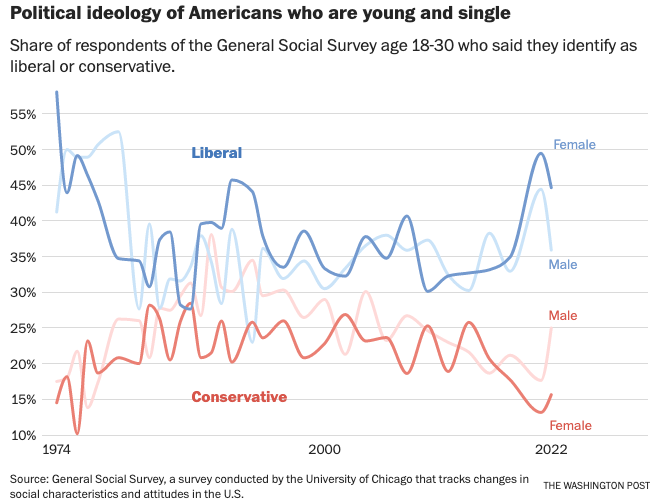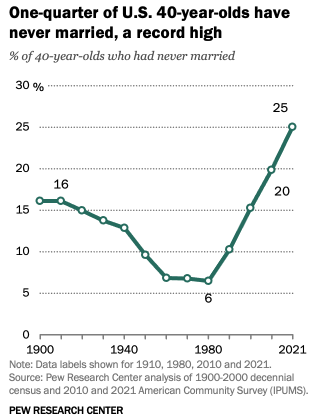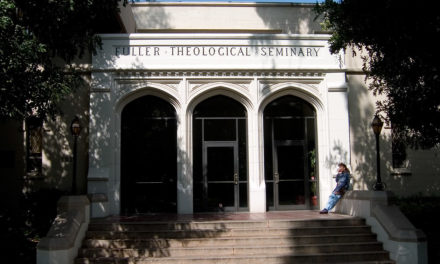Political and ideological polarization in America has worsened in recent years. Now that divide is threatening to exacerbate the already severe decline in marriage rates.
In a recent and important editorial, the Washington Post (not generally a friend of Christians or conservatives) warns that increasing polarization is threatening to further dampen marriage rates, and make future marriages worse.
“Since Mr. Trump’s election in 2016, the percentage of single women ages 18-30 who identify as liberal has shot up from slightly over 20 percent to 32 percent,” the Post writes. But there’s a problem. “Young men have not followed suit. If anything, they have grown more conservative.”

The Post observes that this ideological gap may not have been as problematic for marriage rates in previous generations. “But, increasingly, the political is personal,” the Post notes. “A 2021 survey of college students found that 71 percent of Democrats would not date someone with opposing views.”
When most women are liberal, and most men are conservative, and neither are willing to date someone from a differing political camp, the end result is less dating, fewer marriages and fewer children.
The Post cites researchers Lyman Stone and Brad Wilcox who have noted,
About 1 in 5 young singles will have little choice but to marry someone outside their ideological tribe. The other option is that they decline to get married at all – not an ideal outcome considering the data showing that marriage is good for the health of societies and individuals alike.
While political and ideological polarization certainly is not the only – or even main – cause of the present marriage decline, it is certainly a relevant and important factor.
Our nation has seen a dramatic decline in marriage in recent years.
As the Pew Research Center has found, a record high number of 40-year-olds have never married as of 2021, reaching 25% in 2021.

This is having deeply negative consequences because, as the Daily Citizen has previously chronicled (here, here, here, here, here and here), marriage is very good for both men and women.
Marriage provides great health, financial, social, sexual and psychological benefits to both adult men and women – and to their children. Married mothers and fathers are – far and away – the happiest among U.S. adults.
So what, if anything, can be done to help reduce the negative effects of political and ideological polarization in the marriage market?
When it comes to reversing our nation’s marriage decline, there is no quick fix. There are myriad factors that contribute to it. Financial pressures cause adults to delay family formation; so does the high cost of housing, the lack of marriageable men and the rise of religious and moral pluralism.
It would be easy to tell young people, “Don’t make politics so personal, consider dating someone who many not align with your politics.”
But “politics” frequently involves crucial moral matters – issues like abortion, contraception, homosexuality and transgenderism – that have a great impact on how partners relate to one another and what they teach their children.
It’s much more difficult to form happy and healthy marriages without united values, a shared religion and common purpose in life.
The Daily Citizen spoke with Lisa Anderson, Director of Young Adults and host of The Boundless Show at Focus on the Family, regarding advice for young adults navigating political differences while dating.
“Different political leanings or opinions don’t have to be dealbreakers in dating,” Anderson said, “but they certainly merit serious conversation, especially if the issue is a moral or convictional one. This is why I’m a big fan of dating in community as well as doing pre-engagement counseling.”
She suggested four questions for young adults to ponder when considering dating someone from the opposite end of the political spectrum:
- Is the conflict you’re having with your significant other around core values or simply strategies for getting things done?
- Does your date’s position challenge or defy biblical absolutes?
- Are policies prioritized over people?
- And perhaps most importantly, where are both of you putting your hope — in political outcomes or a sovereign God?
“Differences here can wave a yellow or even red flag if not addressed honestly and objectively,” Anderson cautioned. She added:
Here’s the bottom line: Does Scripture say to not marry someone on the other side of a contentious debate? No. Does it say to never tie the knot with someone from a different political party? No. But the Bible is very clear on the application of wisdom, and to run headlong into a relationship where deeply-held convictions differ is anything but wise.
To speak with a family help specialist or request resources, please call us at 1-800-A-FAMILY (232-6459).
If you’re a young adult looking for resources on relationships, adulthood or faith, you can check out Focus on the Family’s Boundless ministry here.
If your marriage is struggling, Focus on the Family offers Hope Restored Marriage Intensives. Hope Restored is a biblically based, Christian counseling experience for couples facing a crisis moment in their marriage or suffering from years of disconnection and relationship decay. You can find out more about Hope Restored here.
Related articles and resources:
Counseling Consultation & Referrals
When Dating and Politics Don’t Mix
Has Cancel Culture Influenced How You Date?
Can We Navigate Politics With Integrity and Civility?
Focus on the Family: Parenting
Marriage and Family Improves Happiness Far More Than a Pay Raise
No, Young Adults, Marriage Has Not ‘Outlived Its Usefulness’
Photo from Shutterstock.






